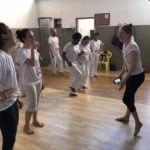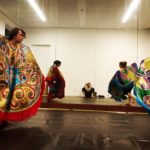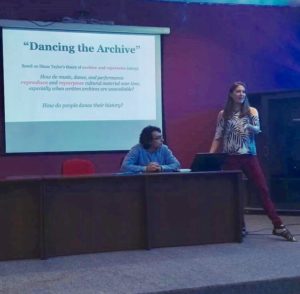This ethnographic project focuses on the frevo tradition of Recife, capital of Brazil’s Pernambuco state. Recife’s annual pre-Lenten Carnival is a spectacle that showcases a variety of local cultural traditions, including frevo—from the word ferver (“to boil”), it is an energetic music and dance that symbolizes Pernambucan culture. Loud brass instruments provide the fast-paced music, and dancers in bright costumes hold tri-colored sombrinhas, or small parasols, as they perform acrobatic feats, dropping to their knees before springing up into high airborne splits. Frevo originates from capoeira, a better known Afro-Brazilian art form, but it represents a particular Pernambucan regional variation on Brazilian national identity.
Frevo is listed among Brazil’s intangible cultural heritage for its role in Pernambuco’s mestiçagem, or “mixed” racial/cultural identity formation. Frevo represents a regional variation on Brazilian national identity and narrates notions of identity that contribute to social empowerment and valuation of popular culture. This research on frevo and other popular dances of the region aims to understand the political role of such performed cultural expression, how it serves to engage communities and empower marginalized individuals.







 “The Frevo Tradition and Pernambucan Cultural Identity in Recife, Brazil” is an ethnographic project by Dr. Kate Spanos, who has received a postdoctoral
“The Frevo Tradition and Pernambucan Cultural Identity in Recife, Brazil” is an ethnographic project by Dr. Kate Spanos, who has received a postdoctoral  I am a dancer and dance scholar who is interested in “dances of resistance” and the role of dance in cultural identity formation. I am especially focused on the interweaving of African and European traditions, stemming from my background in Irish dance, my
I am a dancer and dance scholar who is interested in “dances of resistance” and the role of dance in cultural identity formation. I am especially focused on the interweaving of African and European traditions, stemming from my background in Irish dance, my 